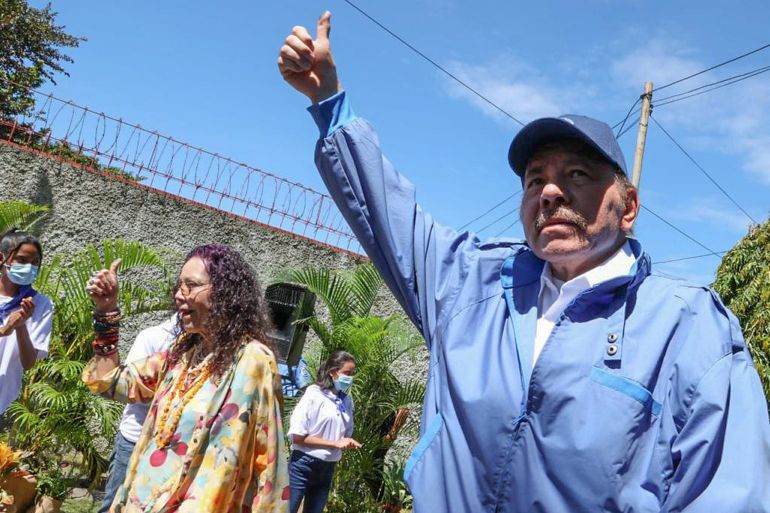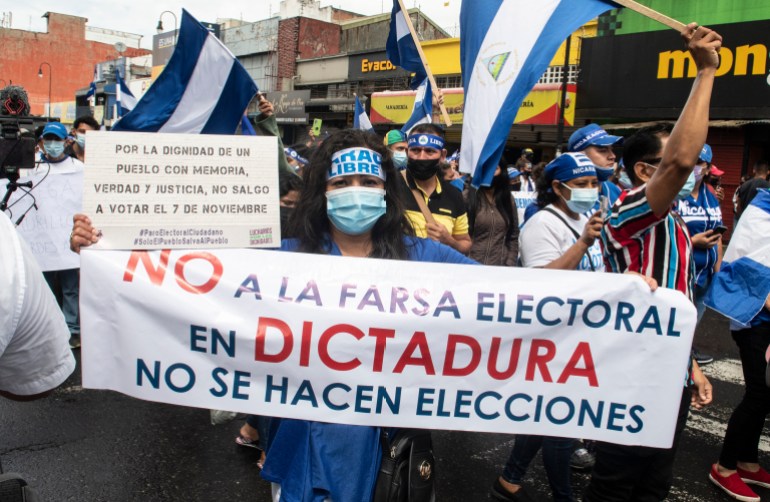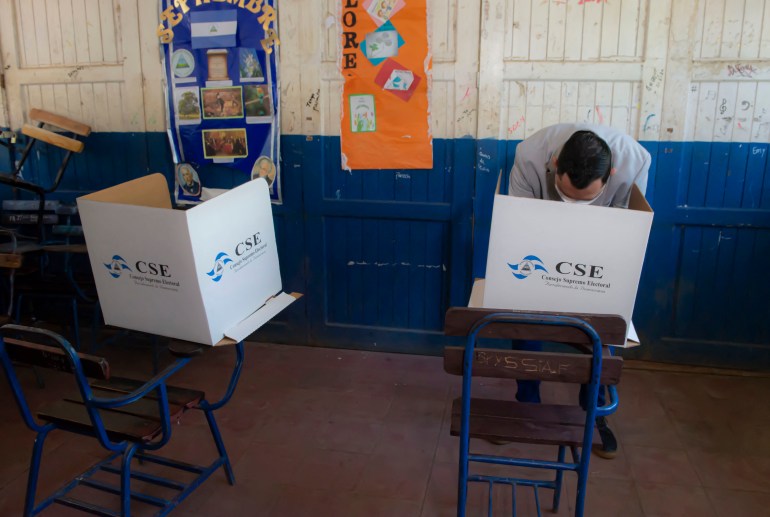Nicaragua’s Ortega set to win another term after ‘farce’ election
President Daniel Ortega is seeking a fourth consecutive term in vote held after months-long crackdown on opposition.

Nicaraguan President Daniel Ortega is on track to win a fourth consecutive term in office, preliminary results show, in an election denounced as “neither free nor fair” that was preceded by a months-long crackdown on opposition figures and candidates.
Ortega’s victory was all but assured before citizens cast their votes on Sunday, with only a handful of little-known candidates standing against him and the opposition challengers considered his biggest would-be threats in prison.
Keep reading
list of 3 itemsNicaragua’s upcoming election ‘has lost all credibility’, US says
Facebook says it shut down Nicaraguan government-run troll farm
Nicaragua’s Supreme Electoral Council said early on Monday that with roughly half the ballots counted, a preliminary tally gave Ortega about 75 percent of the votes in the presidential election, which had been widely condemned as illegitimate by rights groups, several Western powers and regional organisations.
The council put participation at about 65 percent of the 4.5 million Nicaraguans eligible to vote. The opposition had called on Nicaraguans to stay at home in protest of what they said was a tainted electoral process.
Late on Sunday night, some of Ortega’s followers began to celebrate on the streets of the capital Managua. “Yes we did it, Daniel, Daniel!” they shouted in several neighbourhoods as fireworks went off, the AFP news agency reported.

Protests against Ortega, meanwhile, took place in exiled Nicaraguan communities in Costa Rica, Spain, the United States, and Guatemala.
Shortly before the early results were released, US President Joe Biden accused Ortega and his wife, Vice President Rosario Murillo, of orchestrating a “pantomime election that was neither free nor fair”.
The British foreign ministry echoed that, accusing Ortega and his wife of “taking Nicaragua further down the tragic path of authoritarianism”.
Costa Rica, Nicaragua’s neighbour to the south, also rejected the election before the preliminary results came out, while Spanish Foreign Minister Jose Manuel Albares on Monday dismissed the vote as “a farce against the people of Nicaragua, a farce against the international community and above all a farce against democracy”.
International observers from the European Union and the Organization of American States were not allowed to participate, and journalists have been barred from entering the country.
If the results hold, Ortega, whose Sandinista Front party and allies controlled the country’s congress and government institutions prior to the polls, will remain president for another five years.
Ninety of the 92 seats in the congress and Nicaragua’s representation in the Central American Parliament were also on the ballot. Those results were not immediately released.
Crackdown on opposition
As a young revolutionary, Ortega had helped to overthrow anti-communist strongman Anastasio Somoza in 1979 and first served as president from 1985 to 1990.
He returned to power in 2007 and has led an increasingly authoritarian government, according to rights observers.
In 2018, security forces and pro-government armed groups violently cracked down on anti-government protests in the country. More than 300 people were killed during the unrest and at least 1,614 others were arrested, according to a tally by the Organization of American States (OAS).
Ortega, meanwhile, had decried the demonstrators as “terrorists”, saying again on Sunday his presidency was “standing up to those who promote terrorism, finance war, to those who sow terror, death”.
Since June, the Nicaraguan authorities have arrested seven potential presidential challengers on what rights groups call trumped-up charges including undermining “national integrity”, working with foreign governments, and money laundering. They remained in detention on election day.
Dozens more opposition figures also have been arrested in recent months.
On Monday, Amnesty International said the likely prospect of Ortega getting a fourth term as president “is a frightening one for a nation where human rights violations have become increasingly commonplace under his government”.
“Once again, the people of Nicaragua find themselves in a situation where voicing criticism of the government puts them at grave risk,” Erika Guevara-Rosas, Amnesty’s Americas director, said in a statement, calling on the international community to do more to protect the rights of Nicaraguans.
“Daniel Ortega and Rosario Murillo’s renewed mandate as president and vice president augurs the perpetuation of the structures behind the repressive strategy against critical voices and guaranteed impunity for crimes under international law. Moreover, this new period portends the continued forced migration of those who are criminalized for speaking out,” Guevara-Rosas said.
On Saturday, the Blue and White National Union, an opposition alliance, issued an alert after it said at least eight of its leaders were “abducted by the regime in illegal raids”.
Meanwhile, the Civic Alliance, another opposition coalition, reported “harassment, surveillance, intimidation, assault, attacks, illegal and arbitrary detentions” of some of its leaders around Nicaragua in advance of the polls.

In his statement, US President Biden said Ortega and Murillo “now rule Nicaragua as autocrats, no different from the Somoza family that Ortega and the Sandinistas fought four decades ago”.
He called on the duo to take immediate steps to restore democracy and to immediately release the detained opposition figures.
“Until then, the United States, in close coordination with other members of the international community, will use all diplomatic and economic tools at our disposal to support the people of Nicaragua and hold accountable the Ortega-Murillo government and those that facilitate its abuses,” Biden said.
The US and EU have already imposed sanctions against those in Ortega’s inner circle, a move Ortega met by arresting even more of his opponents.
On Friday, a senior US State Department official, who spoke with reporters on the condition of anonymity, said the US government was willing to consider additional targeted sanctions but had tried to avoid measures that would more broadly impact the Nicaraguan people.